Business Level Strategy Analysis: Kuwait's Business Environment
VerifiedAdded on 2021/04/17
|9
|2105
|138
Report
AI Summary
This report critically analyzes Kuwait's business-level strategy, focusing on policies designed to attract Multinational Corporations (MNCs) and protect domestic firms within the context of globalization and national competitive advantage. It examines the impact of Foreign Direct Investment (FDI), open-door policies, and international collaborations, such as participation in the International Monetary Fund (IMF), on Kuwait's economic environment. The report also investigates policies like import tariffs and trade barriers implemented to safeguard domestic businesses. Furthermore, it applies Porter's Diamond model to assess Kuwait's competitive advantages, considering factors like infrastructure, skilled labor, and demand conditions. The second part of the report suggests and discusses strategies to enhance the capacity of Kuwaiti firms and create more employment opportunities, including limiting the involvement of international oil companies, enhancing storage capacity, improving industry layout, and sharing capacity through advanced techniques. The analysis underscores the importance of these strategies in fostering economic growth and diversification in Kuwait.
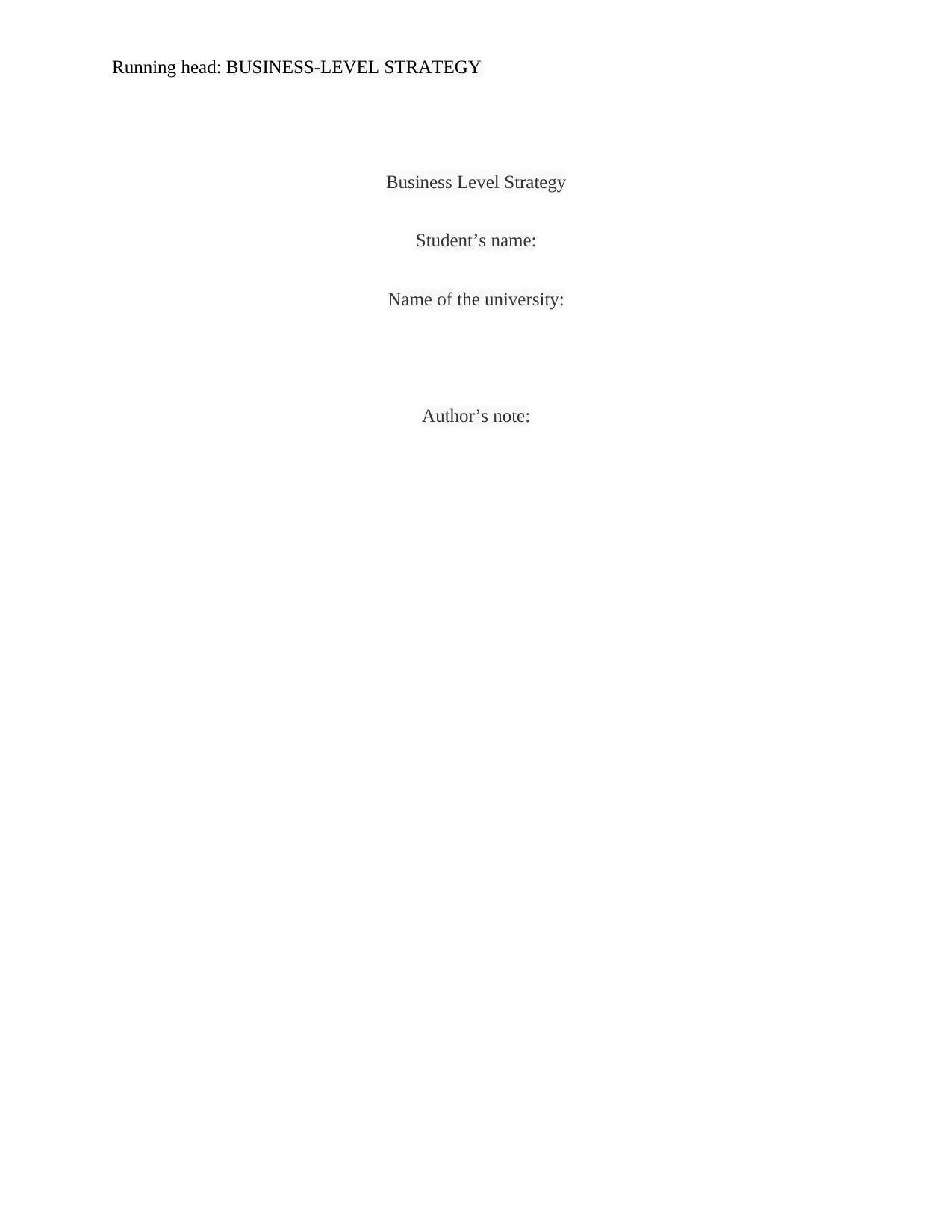
Running head: BUSINESS-LEVEL STRATEGY
Business Level Strategy
Student’s name:
Name of the university:
Author’s note:
Business Level Strategy
Student’s name:
Name of the university:
Author’s note:
Paraphrase This Document
Need a fresh take? Get an instant paraphrase of this document with our AI Paraphraser
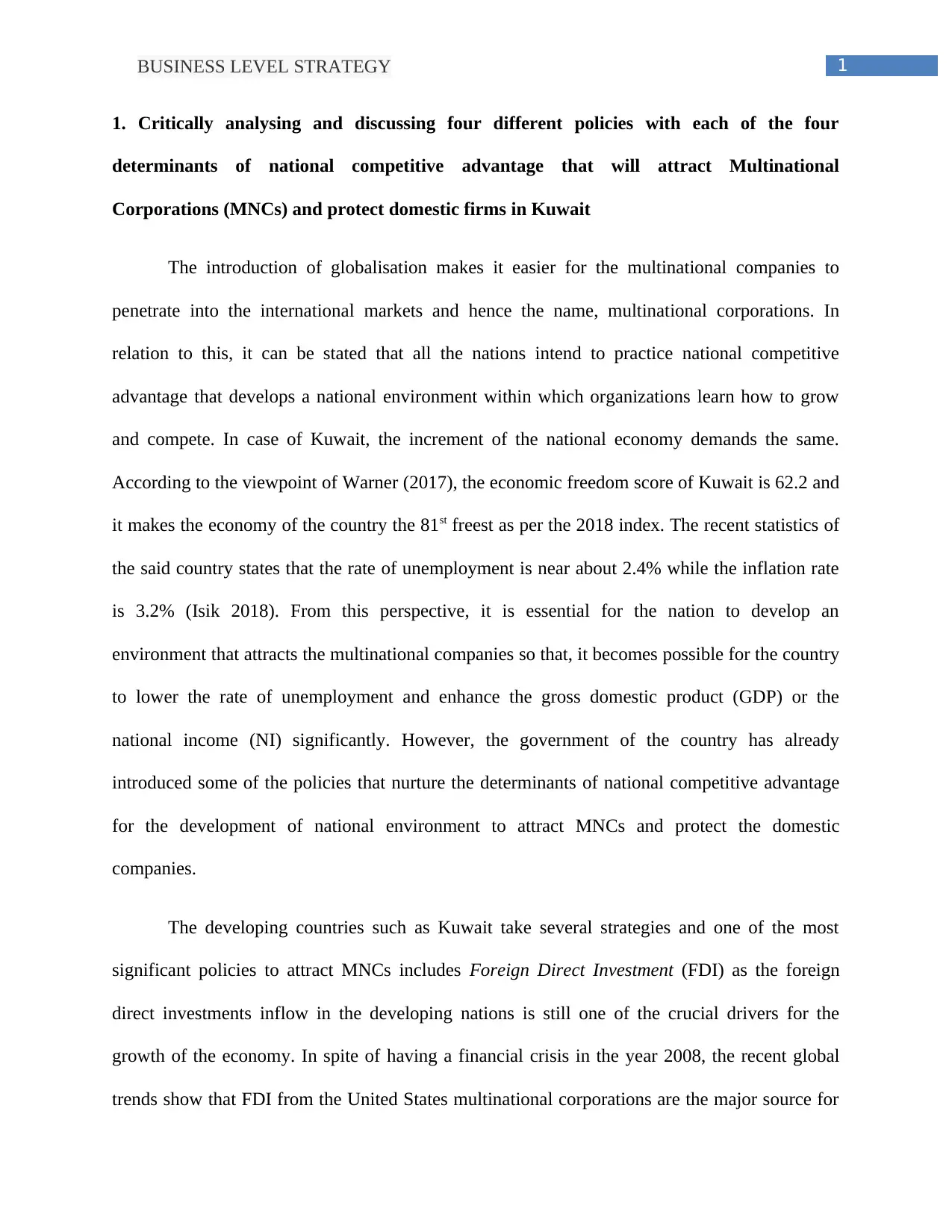
1BUSINESS LEVEL STRATEGY
1. Critically analysing and discussing four different policies with each of the four
determinants of national competitive advantage that will attract Multinational
Corporations (MNCs) and protect domestic firms in Kuwait
The introduction of globalisation makes it easier for the multinational companies to
penetrate into the international markets and hence the name, multinational corporations. In
relation to this, it can be stated that all the nations intend to practice national competitive
advantage that develops a national environment within which organizations learn how to grow
and compete. In case of Kuwait, the increment of the national economy demands the same.
According to the viewpoint of Warner (2017), the economic freedom score of Kuwait is 62.2 and
it makes the economy of the country the 81st freest as per the 2018 index. The recent statistics of
the said country states that the rate of unemployment is near about 2.4% while the inflation rate
is 3.2% (Isik 2018). From this perspective, it is essential for the nation to develop an
environment that attracts the multinational companies so that, it becomes possible for the country
to lower the rate of unemployment and enhance the gross domestic product (GDP) or the
national income (NI) significantly. However, the government of the country has already
introduced some of the policies that nurture the determinants of national competitive advantage
for the development of national environment to attract MNCs and protect the domestic
companies.
The developing countries such as Kuwait take several strategies and one of the most
significant policies to attract MNCs includes Foreign Direct Investment (FDI) as the foreign
direct investments inflow in the developing nations is still one of the crucial drivers for the
growth of the economy. In spite of having a financial crisis in the year 2008, the recent global
trends show that FDI from the United States multinational corporations are the major source for
1. Critically analysing and discussing four different policies with each of the four
determinants of national competitive advantage that will attract Multinational
Corporations (MNCs) and protect domestic firms in Kuwait
The introduction of globalisation makes it easier for the multinational companies to
penetrate into the international markets and hence the name, multinational corporations. In
relation to this, it can be stated that all the nations intend to practice national competitive
advantage that develops a national environment within which organizations learn how to grow
and compete. In case of Kuwait, the increment of the national economy demands the same.
According to the viewpoint of Warner (2017), the economic freedom score of Kuwait is 62.2 and
it makes the economy of the country the 81st freest as per the 2018 index. The recent statistics of
the said country states that the rate of unemployment is near about 2.4% while the inflation rate
is 3.2% (Isik 2018). From this perspective, it is essential for the nation to develop an
environment that attracts the multinational companies so that, it becomes possible for the country
to lower the rate of unemployment and enhance the gross domestic product (GDP) or the
national income (NI) significantly. However, the government of the country has already
introduced some of the policies that nurture the determinants of national competitive advantage
for the development of national environment to attract MNCs and protect the domestic
companies.
The developing countries such as Kuwait take several strategies and one of the most
significant policies to attract MNCs includes Foreign Direct Investment (FDI) as the foreign
direct investments inflow in the developing nations is still one of the crucial drivers for the
growth of the economy. In spite of having a financial crisis in the year 2008, the recent global
trends show that FDI from the United States multinational corporations are the major source for
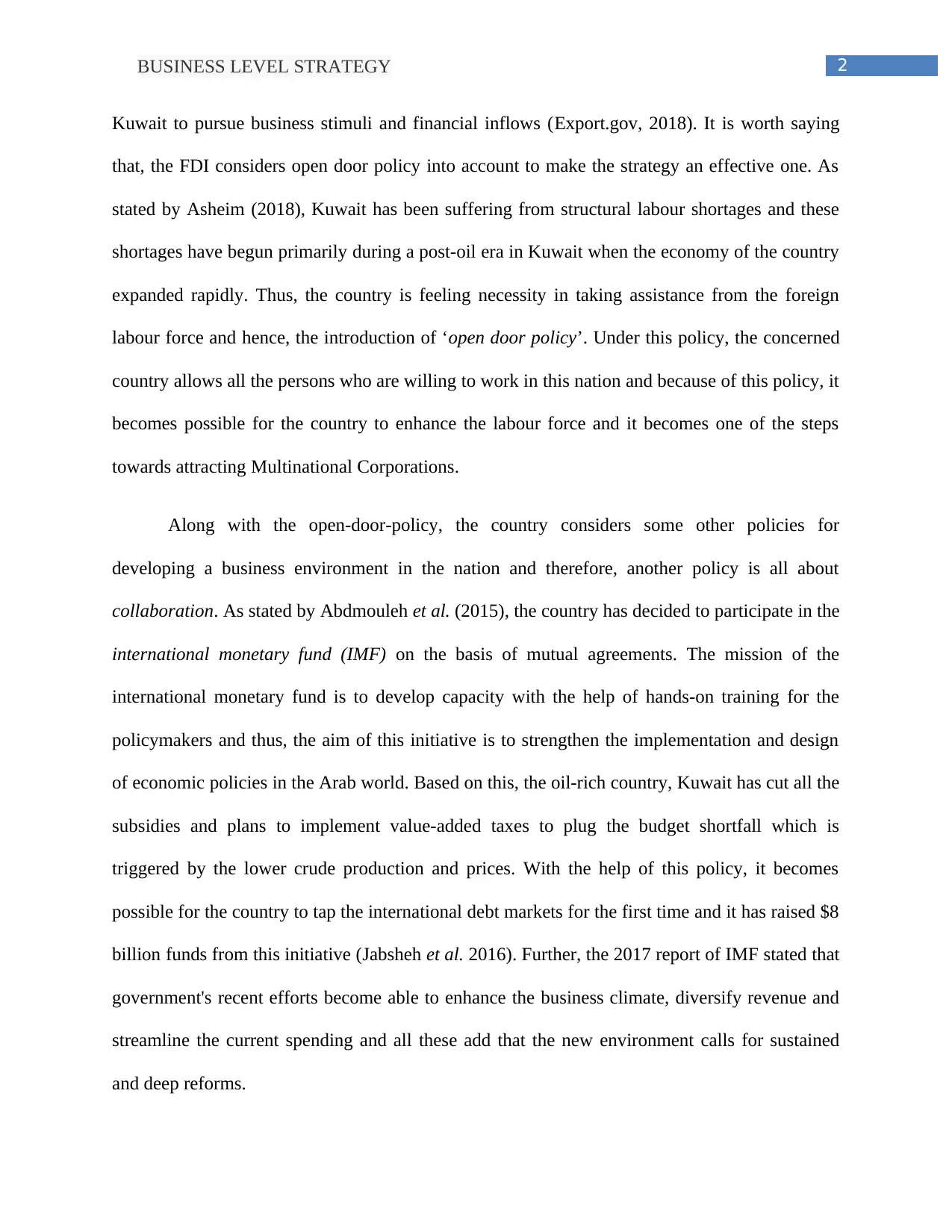
2BUSINESS LEVEL STRATEGY
Kuwait to pursue business stimuli and financial inflows (Export.gov, 2018). It is worth saying
that, the FDI considers open door policy into account to make the strategy an effective one. As
stated by Asheim (2018), Kuwait has been suffering from structural labour shortages and these
shortages have begun primarily during a post-oil era in Kuwait when the economy of the country
expanded rapidly. Thus, the country is feeling necessity in taking assistance from the foreign
labour force and hence, the introduction of ‘open door policy’. Under this policy, the concerned
country allows all the persons who are willing to work in this nation and because of this policy, it
becomes possible for the country to enhance the labour force and it becomes one of the steps
towards attracting Multinational Corporations.
Along with the open-door-policy, the country considers some other policies for
developing a business environment in the nation and therefore, another policy is all about
collaboration. As stated by Abdmouleh et al. (2015), the country has decided to participate in the
international monetary fund (IMF) on the basis of mutual agreements. The mission of the
international monetary fund is to develop capacity with the help of hands-on training for the
policymakers and thus, the aim of this initiative is to strengthen the implementation and design
of economic policies in the Arab world. Based on this, the oil-rich country, Kuwait has cut all the
subsidies and plans to implement value-added taxes to plug the budget shortfall which is
triggered by the lower crude production and prices. With the help of this policy, it becomes
possible for the country to tap the international debt markets for the first time and it has raised $8
billion funds from this initiative (Jabsheh et al. 2016). Further, the 2017 report of IMF stated that
government's recent efforts become able to enhance the business climate, diversify revenue and
streamline the current spending and all these add that the new environment calls for sustained
and deep reforms.
Kuwait to pursue business stimuli and financial inflows (Export.gov, 2018). It is worth saying
that, the FDI considers open door policy into account to make the strategy an effective one. As
stated by Asheim (2018), Kuwait has been suffering from structural labour shortages and these
shortages have begun primarily during a post-oil era in Kuwait when the economy of the country
expanded rapidly. Thus, the country is feeling necessity in taking assistance from the foreign
labour force and hence, the introduction of ‘open door policy’. Under this policy, the concerned
country allows all the persons who are willing to work in this nation and because of this policy, it
becomes possible for the country to enhance the labour force and it becomes one of the steps
towards attracting Multinational Corporations.
Along with the open-door-policy, the country considers some other policies for
developing a business environment in the nation and therefore, another policy is all about
collaboration. As stated by Abdmouleh et al. (2015), the country has decided to participate in the
international monetary fund (IMF) on the basis of mutual agreements. The mission of the
international monetary fund is to develop capacity with the help of hands-on training for the
policymakers and thus, the aim of this initiative is to strengthen the implementation and design
of economic policies in the Arab world. Based on this, the oil-rich country, Kuwait has cut all the
subsidies and plans to implement value-added taxes to plug the budget shortfall which is
triggered by the lower crude production and prices. With the help of this policy, it becomes
possible for the country to tap the international debt markets for the first time and it has raised $8
billion funds from this initiative (Jabsheh et al. 2016). Further, the 2017 report of IMF stated that
government's recent efforts become able to enhance the business climate, diversify revenue and
streamline the current spending and all these add that the new environment calls for sustained
and deep reforms.
⊘ This is a preview!⊘
Do you want full access?
Subscribe today to unlock all pages.

Trusted by 1+ million students worldwide
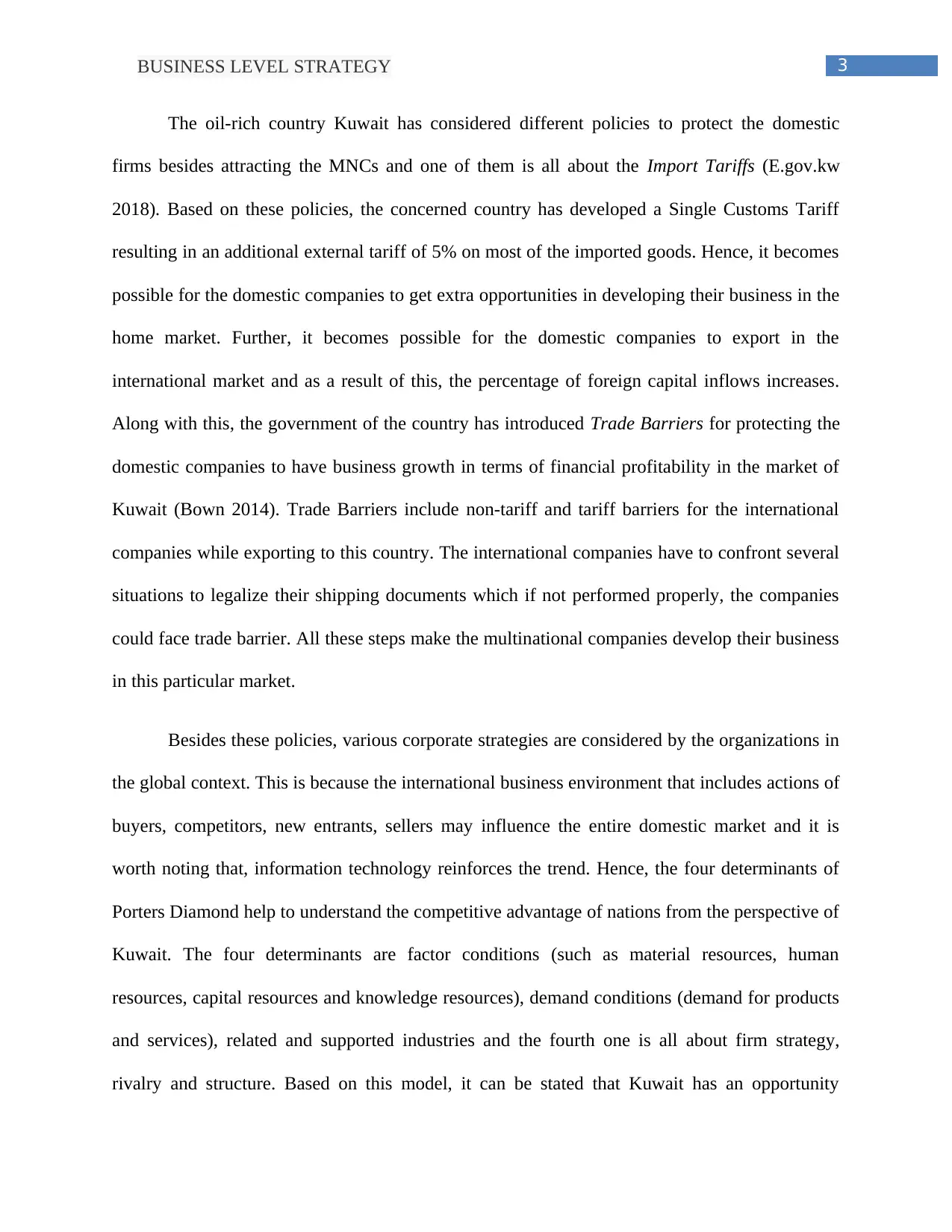
3BUSINESS LEVEL STRATEGY
The oil-rich country Kuwait has considered different policies to protect the domestic
firms besides attracting the MNCs and one of them is all about the Import Tariffs (E.gov.kw
2018). Based on these policies, the concerned country has developed a Single Customs Tariff
resulting in an additional external tariff of 5% on most of the imported goods. Hence, it becomes
possible for the domestic companies to get extra opportunities in developing their business in the
home market. Further, it becomes possible for the domestic companies to export in the
international market and as a result of this, the percentage of foreign capital inflows increases.
Along with this, the government of the country has introduced Trade Barriers for protecting the
domestic companies to have business growth in terms of financial profitability in the market of
Kuwait (Bown 2014). Trade Barriers include non-tariff and tariff barriers for the international
companies while exporting to this country. The international companies have to confront several
situations to legalize their shipping documents which if not performed properly, the companies
could face trade barrier. All these steps make the multinational companies develop their business
in this particular market.
Besides these policies, various corporate strategies are considered by the organizations in
the global context. This is because the international business environment that includes actions of
buyers, competitors, new entrants, sellers may influence the entire domestic market and it is
worth noting that, information technology reinforces the trend. Hence, the four determinants of
Porters Diamond help to understand the competitive advantage of nations from the perspective of
Kuwait. The four determinants are factor conditions (such as material resources, human
resources, capital resources and knowledge resources), demand conditions (demand for products
and services), related and supported industries and the fourth one is all about firm strategy,
rivalry and structure. Based on this model, it can be stated that Kuwait has an opportunity
The oil-rich country Kuwait has considered different policies to protect the domestic
firms besides attracting the MNCs and one of them is all about the Import Tariffs (E.gov.kw
2018). Based on these policies, the concerned country has developed a Single Customs Tariff
resulting in an additional external tariff of 5% on most of the imported goods. Hence, it becomes
possible for the domestic companies to get extra opportunities in developing their business in the
home market. Further, it becomes possible for the domestic companies to export in the
international market and as a result of this, the percentage of foreign capital inflows increases.
Along with this, the government of the country has introduced Trade Barriers for protecting the
domestic companies to have business growth in terms of financial profitability in the market of
Kuwait (Bown 2014). Trade Barriers include non-tariff and tariff barriers for the international
companies while exporting to this country. The international companies have to confront several
situations to legalize their shipping documents which if not performed properly, the companies
could face trade barrier. All these steps make the multinational companies develop their business
in this particular market.
Besides these policies, various corporate strategies are considered by the organizations in
the global context. This is because the international business environment that includes actions of
buyers, competitors, new entrants, sellers may influence the entire domestic market and it is
worth noting that, information technology reinforces the trend. Hence, the four determinants of
Porters Diamond help to understand the competitive advantage of nations from the perspective of
Kuwait. The four determinants are factor conditions (such as material resources, human
resources, capital resources and knowledge resources), demand conditions (demand for products
and services), related and supported industries and the fourth one is all about firm strategy,
rivalry and structure. Based on this model, it can be stated that Kuwait has an opportunity
Paraphrase This Document
Need a fresh take? Get an instant paraphrase of this document with our AI Paraphraser
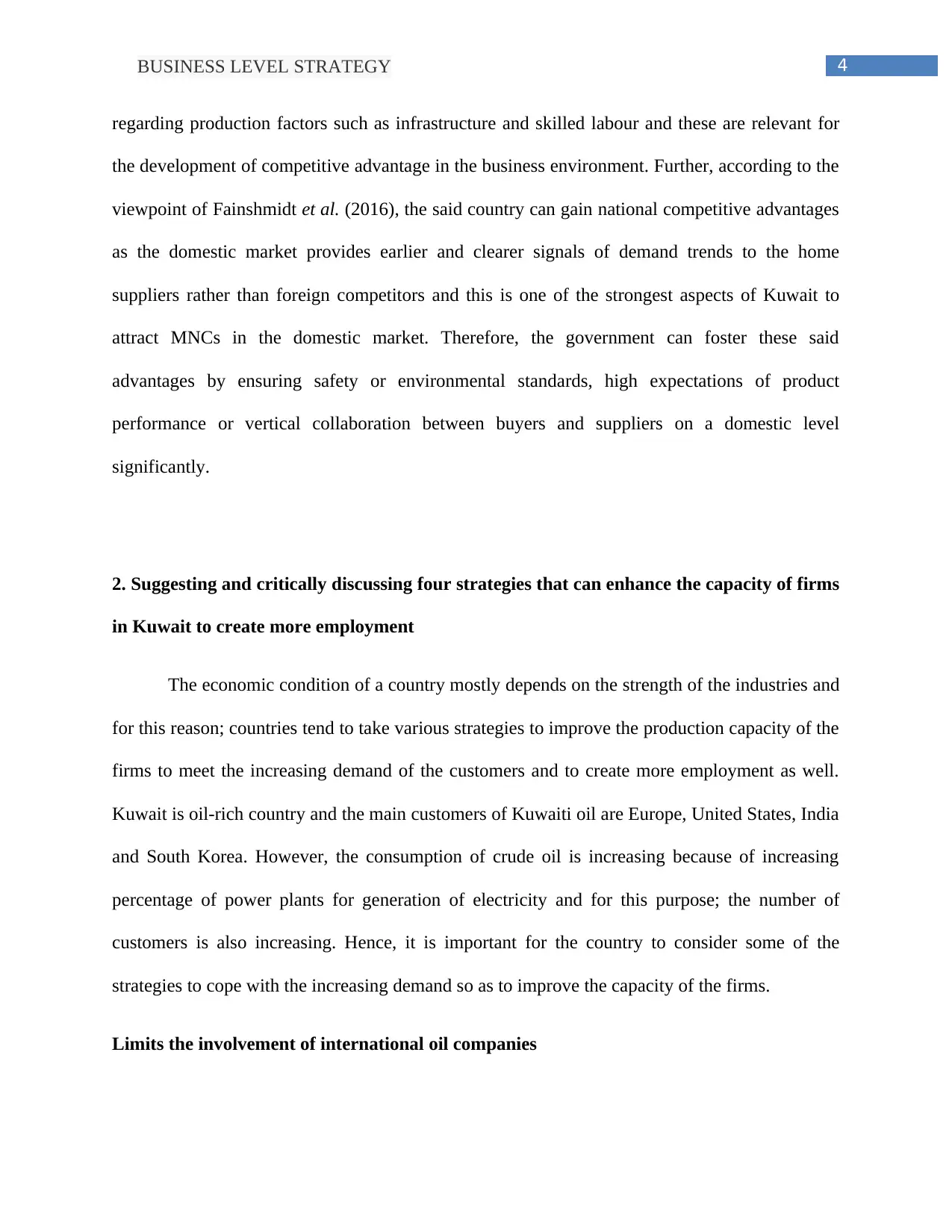
4BUSINESS LEVEL STRATEGY
regarding production factors such as infrastructure and skilled labour and these are relevant for
the development of competitive advantage in the business environment. Further, according to the
viewpoint of Fainshmidt et al. (2016), the said country can gain national competitive advantages
as the domestic market provides earlier and clearer signals of demand trends to the home
suppliers rather than foreign competitors and this is one of the strongest aspects of Kuwait to
attract MNCs in the domestic market. Therefore, the government can foster these said
advantages by ensuring safety or environmental standards, high expectations of product
performance or vertical collaboration between buyers and suppliers on a domestic level
significantly.
2. Suggesting and critically discussing four strategies that can enhance the capacity of firms
in Kuwait to create more employment
The economic condition of a country mostly depends on the strength of the industries and
for this reason; countries tend to take various strategies to improve the production capacity of the
firms to meet the increasing demand of the customers and to create more employment as well.
Kuwait is oil-rich country and the main customers of Kuwaiti oil are Europe, United States, India
and South Korea. However, the consumption of crude oil is increasing because of increasing
percentage of power plants for generation of electricity and for this purpose; the number of
customers is also increasing. Hence, it is important for the country to consider some of the
strategies to cope with the increasing demand so as to improve the capacity of the firms.
Limits the involvement of international oil companies
regarding production factors such as infrastructure and skilled labour and these are relevant for
the development of competitive advantage in the business environment. Further, according to the
viewpoint of Fainshmidt et al. (2016), the said country can gain national competitive advantages
as the domestic market provides earlier and clearer signals of demand trends to the home
suppliers rather than foreign competitors and this is one of the strongest aspects of Kuwait to
attract MNCs in the domestic market. Therefore, the government can foster these said
advantages by ensuring safety or environmental standards, high expectations of product
performance or vertical collaboration between buyers and suppliers on a domestic level
significantly.
2. Suggesting and critically discussing four strategies that can enhance the capacity of firms
in Kuwait to create more employment
The economic condition of a country mostly depends on the strength of the industries and
for this reason; countries tend to take various strategies to improve the production capacity of the
firms to meet the increasing demand of the customers and to create more employment as well.
Kuwait is oil-rich country and the main customers of Kuwaiti oil are Europe, United States, India
and South Korea. However, the consumption of crude oil is increasing because of increasing
percentage of power plants for generation of electricity and for this purpose; the number of
customers is also increasing. Hence, it is important for the country to consider some of the
strategies to cope with the increasing demand so as to improve the capacity of the firms.
Limits the involvement of international oil companies
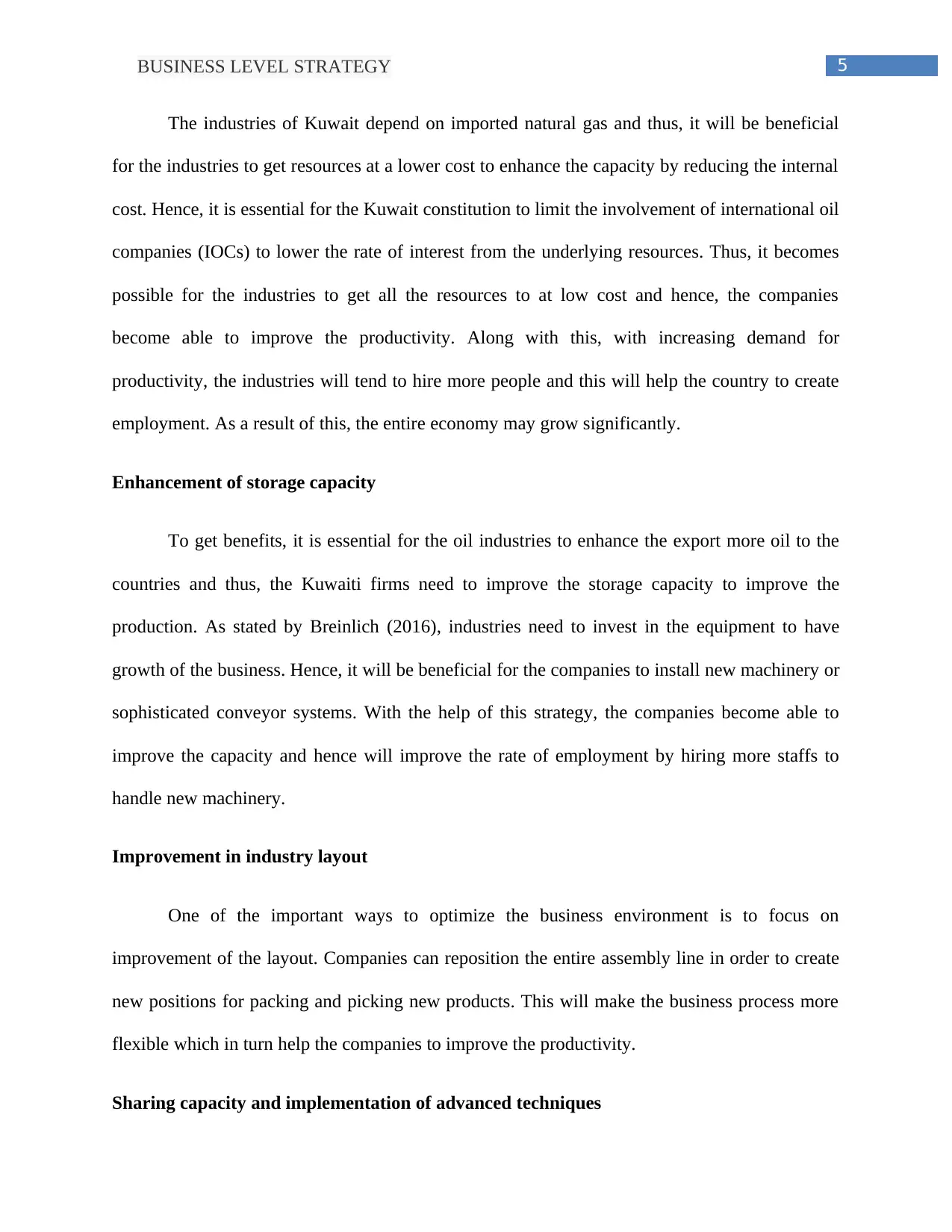
5BUSINESS LEVEL STRATEGY
The industries of Kuwait depend on imported natural gas and thus, it will be beneficial
for the industries to get resources at a lower cost to enhance the capacity by reducing the internal
cost. Hence, it is essential for the Kuwait constitution to limit the involvement of international oil
companies (IOCs) to lower the rate of interest from the underlying resources. Thus, it becomes
possible for the industries to get all the resources to at low cost and hence, the companies
become able to improve the productivity. Along with this, with increasing demand for
productivity, the industries will tend to hire more people and this will help the country to create
employment. As a result of this, the entire economy may grow significantly.
Enhancement of storage capacity
To get benefits, it is essential for the oil industries to enhance the export more oil to the
countries and thus, the Kuwaiti firms need to improve the storage capacity to improve the
production. As stated by Breinlich (2016), industries need to invest in the equipment to have
growth of the business. Hence, it will be beneficial for the companies to install new machinery or
sophisticated conveyor systems. With the help of this strategy, the companies become able to
improve the capacity and hence will improve the rate of employment by hiring more staffs to
handle new machinery.
Improvement in industry layout
One of the important ways to optimize the business environment is to focus on
improvement of the layout. Companies can reposition the entire assembly line in order to create
new positions for packing and picking new products. This will make the business process more
flexible which in turn help the companies to improve the productivity.
Sharing capacity and implementation of advanced techniques
The industries of Kuwait depend on imported natural gas and thus, it will be beneficial
for the industries to get resources at a lower cost to enhance the capacity by reducing the internal
cost. Hence, it is essential for the Kuwait constitution to limit the involvement of international oil
companies (IOCs) to lower the rate of interest from the underlying resources. Thus, it becomes
possible for the industries to get all the resources to at low cost and hence, the companies
become able to improve the productivity. Along with this, with increasing demand for
productivity, the industries will tend to hire more people and this will help the country to create
employment. As a result of this, the entire economy may grow significantly.
Enhancement of storage capacity
To get benefits, it is essential for the oil industries to enhance the export more oil to the
countries and thus, the Kuwaiti firms need to improve the storage capacity to improve the
production. As stated by Breinlich (2016), industries need to invest in the equipment to have
growth of the business. Hence, it will be beneficial for the companies to install new machinery or
sophisticated conveyor systems. With the help of this strategy, the companies become able to
improve the capacity and hence will improve the rate of employment by hiring more staffs to
handle new machinery.
Improvement in industry layout
One of the important ways to optimize the business environment is to focus on
improvement of the layout. Companies can reposition the entire assembly line in order to create
new positions for packing and picking new products. This will make the business process more
flexible which in turn help the companies to improve the productivity.
Sharing capacity and implementation of advanced techniques
⊘ This is a preview!⊘
Do you want full access?
Subscribe today to unlock all pages.

Trusted by 1+ million students worldwide
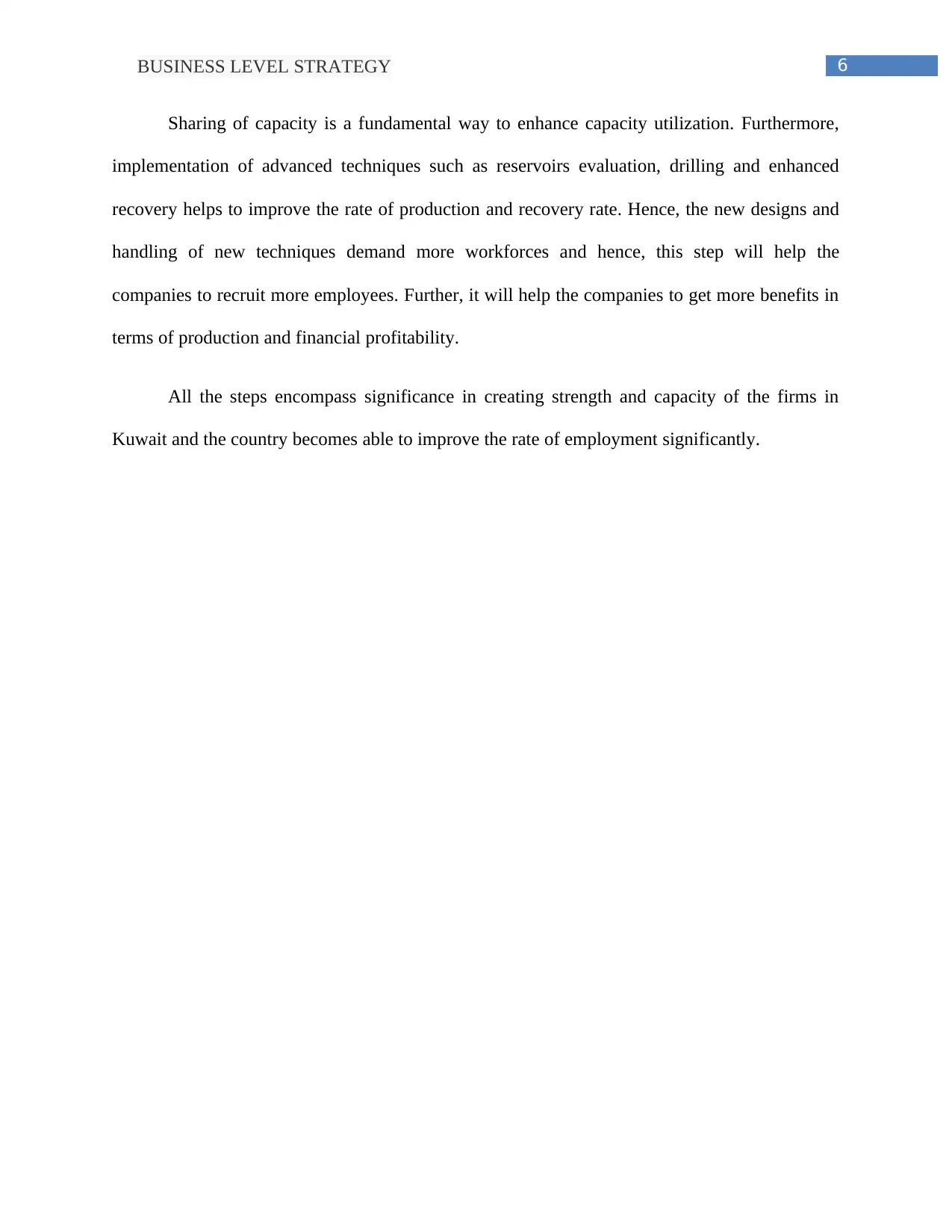
6BUSINESS LEVEL STRATEGY
Sharing of capacity is a fundamental way to enhance capacity utilization. Furthermore,
implementation of advanced techniques such as reservoirs evaluation, drilling and enhanced
recovery helps to improve the rate of production and recovery rate. Hence, the new designs and
handling of new techniques demand more workforces and hence, this step will help the
companies to recruit more employees. Further, it will help the companies to get more benefits in
terms of production and financial profitability.
All the steps encompass significance in creating strength and capacity of the firms in
Kuwait and the country becomes able to improve the rate of employment significantly.
Sharing of capacity is a fundamental way to enhance capacity utilization. Furthermore,
implementation of advanced techniques such as reservoirs evaluation, drilling and enhanced
recovery helps to improve the rate of production and recovery rate. Hence, the new designs and
handling of new techniques demand more workforces and hence, this step will help the
companies to recruit more employees. Further, it will help the companies to get more benefits in
terms of production and financial profitability.
All the steps encompass significance in creating strength and capacity of the firms in
Kuwait and the country becomes able to improve the rate of employment significantly.
Paraphrase This Document
Need a fresh take? Get an instant paraphrase of this document with our AI Paraphraser
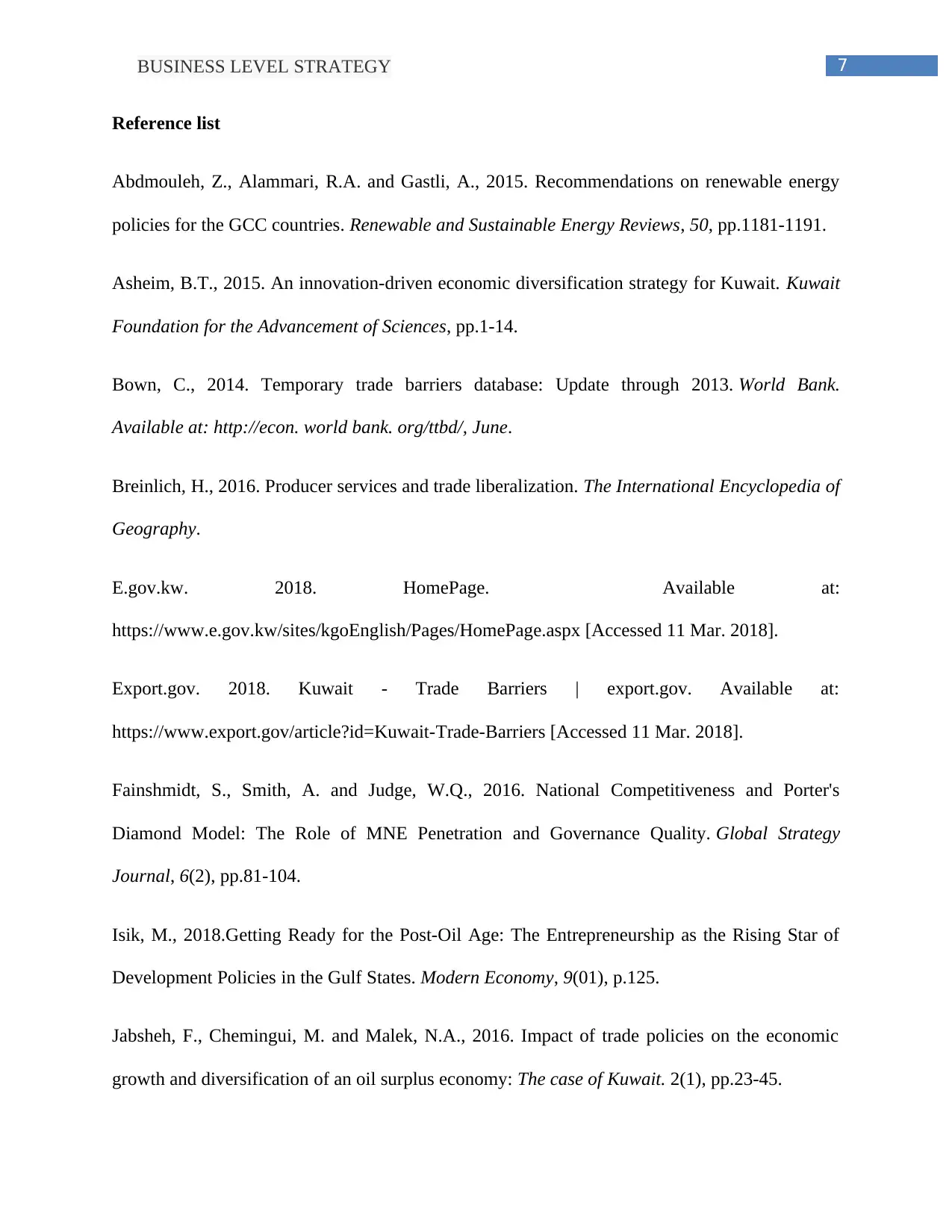
7BUSINESS LEVEL STRATEGY
Reference list
Abdmouleh, Z., Alammari, R.A. and Gastli, A., 2015. Recommendations on renewable energy
policies for the GCC countries. Renewable and Sustainable Energy Reviews, 50, pp.1181-1191.
Asheim, B.T., 2015. An innovation-driven economic diversification strategy for Kuwait. Kuwait
Foundation for the Advancement of Sciences, pp.1-14.
Bown, C., 2014. Temporary trade barriers database: Update through 2013. World Bank.
Available at: http://econ. world bank. org/ttbd/, June.
Breinlich, H., 2016. Producer services and trade liberalization. The International Encyclopedia of
Geography.
E.gov.kw. 2018. HomePage. Available at:
https://www.e.gov.kw/sites/kgoEnglish/Pages/HomePage.aspx [Accessed 11 Mar. 2018].
Export.gov. 2018. Kuwait - Trade Barriers | export.gov. Available at:
https://www.export.gov/article?id=Kuwait-Trade-Barriers [Accessed 11 Mar. 2018].
Fainshmidt, S., Smith, A. and Judge, W.Q., 2016. National Competitiveness and Porter's
Diamond Model: The Role of MNE Penetration and Governance Quality. Global Strategy
Journal, 6(2), pp.81-104.
Isik, M., 2018.Getting Ready for the Post-Oil Age: The Entrepreneurship as the Rising Star of
Development Policies in the Gulf States. Modern Economy, 9(01), p.125.
Jabsheh, F., Chemingui, M. and Malek, N.A., 2016. Impact of trade policies on the economic
growth and diversification of an oil surplus economy: The case of Kuwait. 2(1), pp.23-45.
Reference list
Abdmouleh, Z., Alammari, R.A. and Gastli, A., 2015. Recommendations on renewable energy
policies for the GCC countries. Renewable and Sustainable Energy Reviews, 50, pp.1181-1191.
Asheim, B.T., 2015. An innovation-driven economic diversification strategy for Kuwait. Kuwait
Foundation for the Advancement of Sciences, pp.1-14.
Bown, C., 2014. Temporary trade barriers database: Update through 2013. World Bank.
Available at: http://econ. world bank. org/ttbd/, June.
Breinlich, H., 2016. Producer services and trade liberalization. The International Encyclopedia of
Geography.
E.gov.kw. 2018. HomePage. Available at:
https://www.e.gov.kw/sites/kgoEnglish/Pages/HomePage.aspx [Accessed 11 Mar. 2018].
Export.gov. 2018. Kuwait - Trade Barriers | export.gov. Available at:
https://www.export.gov/article?id=Kuwait-Trade-Barriers [Accessed 11 Mar. 2018].
Fainshmidt, S., Smith, A. and Judge, W.Q., 2016. National Competitiveness and Porter's
Diamond Model: The Role of MNE Penetration and Governance Quality. Global Strategy
Journal, 6(2), pp.81-104.
Isik, M., 2018.Getting Ready for the Post-Oil Age: The Entrepreneurship as the Rising Star of
Development Policies in the Gulf States. Modern Economy, 9(01), p.125.
Jabsheh, F., Chemingui, M. and Malek, N.A., 2016. Impact of trade policies on the economic
growth and diversification of an oil surplus economy: The case of Kuwait. 2(1), pp.23-45.
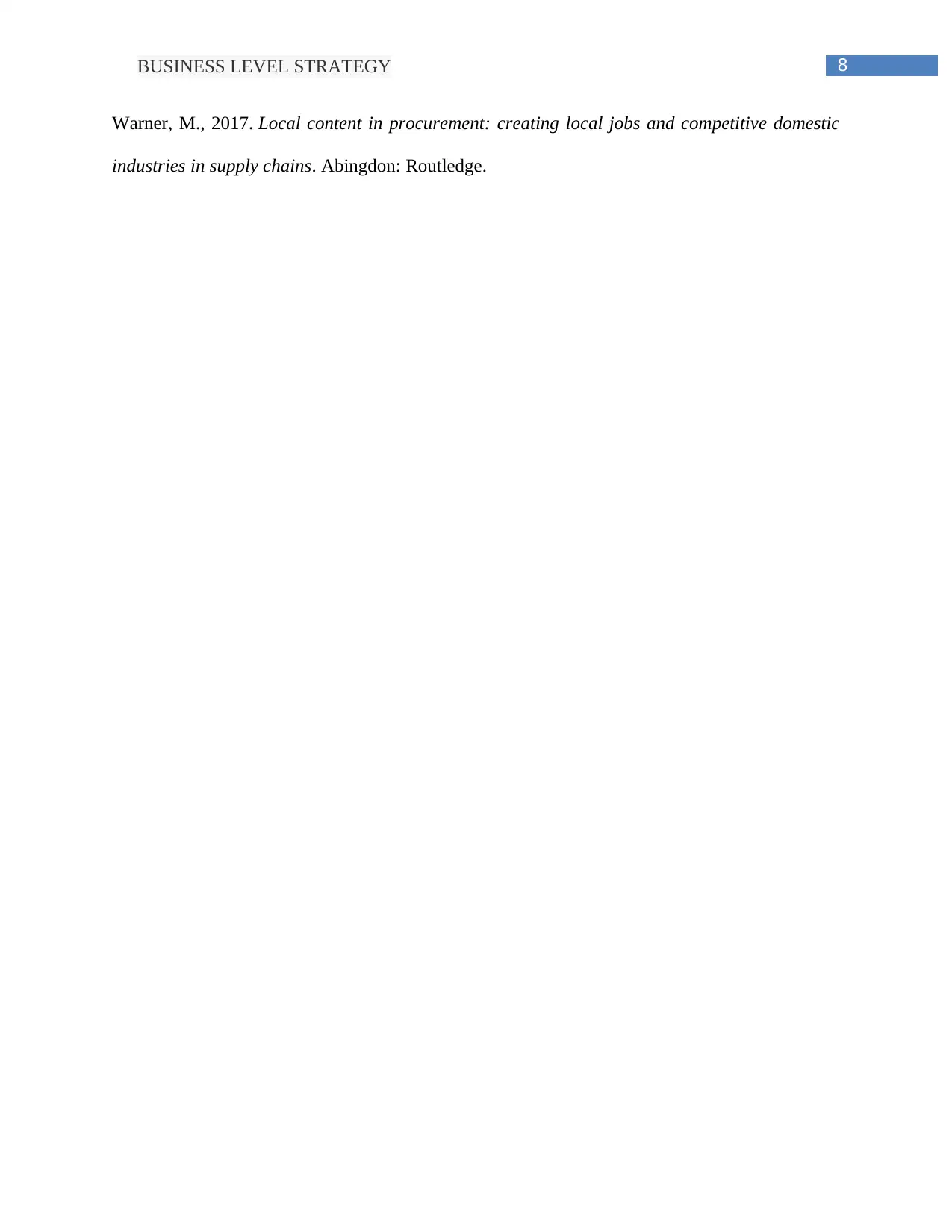
8BUSINESS LEVEL STRATEGY
Warner, M., 2017. Local content in procurement: creating local jobs and competitive domestic
industries in supply chains. Abingdon: Routledge.
Warner, M., 2017. Local content in procurement: creating local jobs and competitive domestic
industries in supply chains. Abingdon: Routledge.
⊘ This is a preview!⊘
Do you want full access?
Subscribe today to unlock all pages.

Trusted by 1+ million students worldwide
1 out of 9
Related Documents
Your All-in-One AI-Powered Toolkit for Academic Success.
+13062052269
info@desklib.com
Available 24*7 on WhatsApp / Email
![[object Object]](/_next/static/media/star-bottom.7253800d.svg)
Unlock your academic potential
Copyright © 2020–2026 A2Z Services. All Rights Reserved. Developed and managed by ZUCOL.





